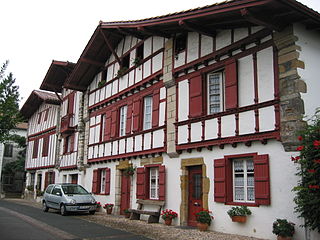Related Research Articles

Hungarian is a Uralic language spoken in Hungary and parts of several neighbouring countries that used to belong to it. It is the official language of Hungary and one of the 24 official languages of the European Union. Outside Hungary, it is also spoken by Hungarian communities in southern Slovakia, western Ukraine (Subcarpathia), central and western Romania (Transylvania), northern Serbia (Vojvodina), northern Croatia, northeastern Slovenia (Prekmurje), and eastern Austria.
Matres lectionis are consonants that are used to indicate a vowel, primarily in the writing of Semitic languages such as Arabic, Hebrew and Syriac. The letters that do this in Hebrew are alephא, heה, vavו and yodי, and in Arabic, the matres lectionis are ʾalifا, wāwو and yāʾي. The 'yod and waw in particular are more often vowels than they are consonants.
An infix is an affix inserted inside a word stem. It contrasts with adfix, a rare term for an affix attached to the outside of a stem, such as a prefix or suffix.

Aymara is an Aymaran language spoken by the Aymara people of the Bolivian Andes. It is one of only a handful of Native American languages with over one million speakers. Aymara, along with Spanish and Quechua, is an official language in Bolivia and Peru. It is also spoken, to a much lesser extent, by some communities in northern Chile, where it is a recognized minority language.
A diminutive is a word obtained by modifying a root word to convey a slighter degree of its root meaning, either to convey the smallness of the object or quality named, or to convey a sense of intimacy or endearment. A diminutive form is a word-formation device used to express such meanings. A double diminutive is a diminutive form with two diminutive suffixes rather than one.
An augmentative is a morphological form of a word which expresses greater intensity, often in size but also in other attributes. It is the opposite of a diminutive.
Esperanto vocabulary and grammatical forms derive primarily from the Romance languages, with substantial contributions from Germanic languages. The language occupies a middle ground between "naturalistic" constructed languages such as Interlingua, which borrow words en masse from their source languages with little internal derivation, and a priori conlangs such as Solresol, in which the words have no historical connection to other languages. In Esperanto, root words are borrowed and retain much of the form of their source language, whether the phonetic form or orthographic form. However, each root can then form dozens of derivations which may bear little resemblance to equivalent words in the source languages, such as registaro (government), which is derived from the Latinate root reg but has a morphology closer to German or Russian.

Mexican Spanish is the variety of dialects and sociolects of the Spanish language spoken in the United Mexican States. Mexico has the largest number of Spanish speakers, more than double any other country in the world. Spanish is spoken by over 99% of the population, being the mother tongue of 93.8%, and the second language of 5.4%.

The Spanish language has nouns that express concrete objects, groups and classes of objects, qualities, feelings and other abstractions. All nouns have a conventional grammatical gender. Countable nouns inflect for number. However, the division between uncountable and countable nouns is more ambiguous than in English.

Spanish is a Romance language which developed from Vulgar Latin in central areas of the Iberian peninsula and has absorbed many loanwords from other Romance languages like French, Occitan, Catalan, Portuguese, and Italian. Spanish also has lexical influences from Arabic and from Paleohispanic languages such as Iberian, Celtiberian and Basque.
This page is about noun phrases in Hungarian grammar.
The Kuot language, or Panaras, is a language isolate, the only non-Austronesian language spoken on the island of New Ireland, Papua New Guinea. Lindström estimates that there are 1,500 fluent speakers of Kuot. Perhaps due to the small speaker base, there are no significant dialects present within Kuot. It is spoken in 10 villages, including Panaras village of Sentral Niu Ailan Rural LLG in New Ireland Province.

Haketia is an endangered Jewish Romance language also known as Djudeo Spañol, Ladino Occidental, or Western Judaeo-Spanish. It was historically spoken by the North African Sephardim in the Moroccan cities of Tétouan, Tangier, Asilah, Larache, Chefchaouen, Ksar el-Kebir, and the Spanish towns of Ceuta and Melilla. Tetuani Ladino was also spoken in Oran, Algeria. One of the distinctions between Ladino and Haketia (Haquetia) is that the latter incorporates Arabic.

Canarian Spanish or Canary Island Spanish is a variant of standard Spanish spoken in the Canary Islands by the Canary Islanders.
Kurdish grammar has many inflections, with prefixes and suffixes added to roots to express grammatical relations and to form words.

Basque surnames are surnames with Basque-language origins or a long, identifiable tradition in the Basque Country. They can be divided into two main types, patronymic and non-patronymic.

Taíno is an extinct Arawakan language that was spoken by the Taíno people of the Caribbean. At the time of Spanish contact, it was the most common language throughout the Caribbean. Classic Taíno was the native language of the Taíno tribes living in the northern Lesser Antilles, Puerto Rico, the Turks and Caicos Islands, and most of Hispaniola, and expanding into Cuba. The Ciboney dialect is essentially unattested, but colonial sources suggest it was very similar to Classic Taíno, and was spoken in the westernmost areas of Hispaniola, the Bahamas, Jamaica, and most of Cuba.
Ramarama, also known as Karo, is a Tupian language of Brazil.
References
- "Breve diccionario etimológico de la lengua española" by Guido Gómez de Silva ( ISBN 968-16-2812-8)